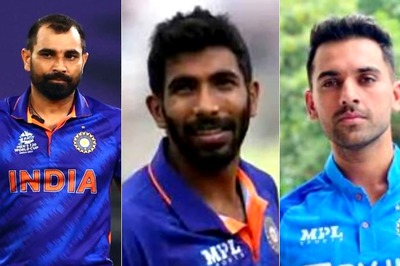
views
KOCHI: Deepavali or the Day of Narakachathurdasi symbolises the destruction of evil and the victory of good which different communities celebrate across the country with gusto, to the accompaniment of the bursting of various kinds of crackers and lighting of several varieties of lamps.Explaining the belief and the myth behind the Deepavali celebration, Brahmin Ladies Welfare Association’s Mattancherry unit president S Santha Sabesan said that Narakachathurdasi is the day on which Sathyabhama’s son Narakasura, who represented all the Asura (evil) instincts and tendencies, was killed by Lord Krishna to bring relief to the god-loving common people who wanted to lead a life of peace in prayers. Sathyabhama, the consort of Lord Krishna, had obtained a boon from the Lord that the day of destruction of Narakasura will be celebrated by all people as the occasion for wiping out all evil habits and for sowing the seeds for good conduct and character. On the Narakachathurdasi day, the devouts wake up before the Brahma Muhurtha (around three hours prior to sunrise) and take bath in hot water. It is believed that Goddess Ganga will be present in the hot water on Narakachathurdasi. It is quite common for the Tamil Brahmins to ask his/her brethren in the early hours of Narakachathurdasi, “Ganga Snanam Aayaacha.” All members of the community take oil bath on the day. Both children and the elders apply gingelly oil on the head and the body after sitting on the Kolam-decorated Aavana Palaka (wooden plank). Usually, the oil is applied by the elders on the head of the children. The elaborate oil bath is followed by the wearing of the new dress blessed with the application of pure turmeric powder on its corners. The children then seek the blessings of the elders after prostrating in front of them. Distribution of different kinds of sweets and bursting of crackers are the inalienable part of the celebrations. The special sweets include Gilebi, Mysorepavu, Ukkara, Inchilehyam (ginger lehyam), mixture, pakkavada. The breakfast menu invariably includes Iddali, the side-dish being chutney or dosapowder mixed with oil. The sounds and the light generated by the bursting of various kinds of crackers are believed to drive away the evil tendencies and inclinations, said Santha Sabesan who was busy with the preparations for elaborate Deepavali celebrations by the Mattancherry unit of the Brahmin Ladies Welfare Association which was founded in 2006.All people across the country celebrate the occasion as the vanquishing of the evil spirit. Some people relate it to the victory of Lord Rama over Ravana. The people received the victorious Lord Rama with thousands of lighted lamps when he returned to Ayodhya after killing Ravana. Lord Rama annihilated Ravana on Deepavali Day, the devouts love to believe. They light lamps and burst crackers on the Deepavali Day in commemoration of this event.An elaborate bath after applying gingelly oil all over the body is part of the Deepavali celebrations of the Malayala Brahmins also. The also are keen on preparing special food items such as iddali, dosa and various other kinds of food items containing blackgram as part of Deepavali celebration.

















Comments
0 comment